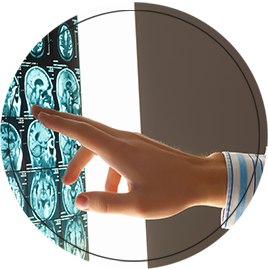Brain Injury / Head Trauma and TBI
Advocating for Accident Victims of Head Trauma in Denver
According to doctors at Colorado University Medical Center, among the leading causes of traumatic brain injury (TBI) are auto accidents, falls, and sports injuries. When TBI, brain trauma, or other closed head injury are caused by the negligent acts of an individual, business, or governmental entity, you may need an aggressive attorney to help you pursue compensation from the responsible party. Brain injury cases can be challenging for a number of reasons, including the possibility that the victim either may not recall the accident or may not have adequate functioning to assist in preparing the case for trial. Also, the effects of a brain injury – such as loss of cognitive ability, diminished consciousness, or emotional disturbances – can be relatively subtle and more difficult for a jury to see than more obvious injuries, such as fractures and lacerations. This may make the assistance of a knowledgeable attorney particularly vital.
Bringing a Claim for Compensation:
Regardless of the exact cause of a brain injury, the case will most likely proceed under the law of negligence. That means the injured person must prove that the defendant owe the injured person a duty to act responsibly, the defendant failed to uphold the duty that was owed,
there a direct causal link between the defendant’s breach of duty and the injured person’s harm, and
the victim sustained actual damages that can be quantified.
In some types of cases, such as medical malpractice or product liability, there may be other inquiries in addition to the basic outline of a negligence lawsuit. On certain occasions, an expert’s opinion may be necessary in order to lay the foundation for proving the particular duty that was owed by the defendant and whether the duty was in fact breached.
An experienced attorney can fully investigate the circumstances of the accident that gave rise to the victim’s harm. This may include a careful review of factual information such as police or accident reports, witness interviews, and photographs.
Obtaining Fair Compensation for the Effects of Brain Injuries:
Establishing the losses caused by the long-term effects of a brain injury can be difficult. Experts may be required to prove economic damages, such as past and future medical expenses, lost wages, and lost earning capacity. An injured person may also be entitled to pursue noneconomic damages, such as pain and suffering. Compensation for head trauma and executive functioning symptoms like headaches, loss of concentration, and memory loss may need to be taken into account.
Protect Your Rights by Enlisting an Injury Lawyer in Denver:
In situations in which the injured person’s own actions contributed to the accident, his or her damages may be reduced in proportion to his or her level of fault, providing that the claimant’s fault was not more than the defendant’s fault. Colorado’s modified comparative fault rule is sometimes called the “51% bar rule” because it bars recovery if the claimant was 51% or more at fault in the accident.
According to doctors at Colorado University Medical Center, among the leading causes of traumatic brain injury (TBI) are auto accidents, falls, and sports injuries. When TBI, brain trauma, or other closed head injury are caused by the negligent acts of an individual, business, or governmental entity, you may need an aggressive attorney to help you pursue compensation from the responsible party. Brain injury cases can be challenging for a number of reasons, including the possibility that the victim either may not recall the accident or may not have adequate functioning to assist in preparing the case for trial. Also, the effects of a brain injury – such as loss of cognitive ability, diminished consciousness, or emotional disturbances – can be relatively subtle and more difficult for a jury to see than more obvious injuries, such as fractures and lacerations. This may make the assistance of a knowledgeable attorney particularly vital.
Bringing a Claim for Compensation:
Regardless of the exact cause of a brain injury, the case will most likely proceed under the law of negligence. That means the injured person must prove that the defendant owe the injured person a duty to act responsibly, the defendant failed to uphold the duty that was owed,
there a direct causal link between the defendant’s breach of duty and the injured person’s harm, and
the victim sustained actual damages that can be quantified.
In some types of cases, such as medical malpractice or product liability, there may be other inquiries in addition to the basic outline of a negligence lawsuit. On certain occasions, an expert’s opinion may be necessary in order to lay the foundation for proving the particular duty that was owed by the defendant and whether the duty was in fact breached.
An experienced attorney can fully investigate the circumstances of the accident that gave rise to the victim’s harm. This may include a careful review of factual information such as police or accident reports, witness interviews, and photographs.
Obtaining Fair Compensation for the Effects of Brain Injuries:
Establishing the losses caused by the long-term effects of a brain injury can be difficult. Experts may be required to prove economic damages, such as past and future medical expenses, lost wages, and lost earning capacity. An injured person may also be entitled to pursue noneconomic damages, such as pain and suffering. Compensation for head trauma and executive functioning symptoms like headaches, loss of concentration, and memory loss may need to be taken into account.
Protect Your Rights by Enlisting an Injury Lawyer in Denver:
In situations in which the injured person’s own actions contributed to the accident, his or her damages may be reduced in proportion to his or her level of fault, providing that the claimant’s fault was not more than the defendant’s fault. Colorado’s modified comparative fault rule is sometimes called the “51% bar rule” because it bars recovery if the claimant was 51% or more at fault in the accident.

